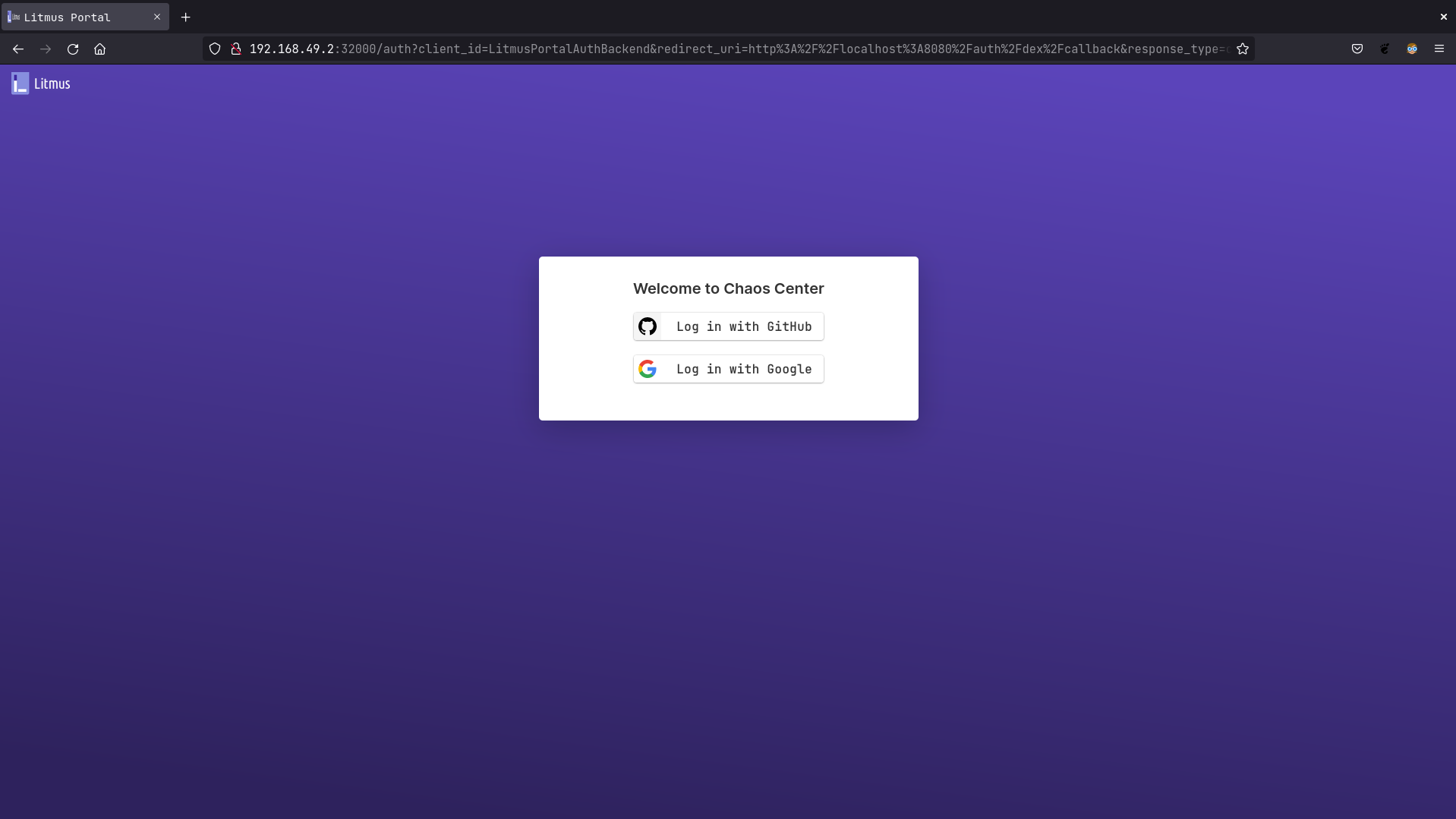6.5 KiB
| id | title | sidebar_label |
|---|---|---|
| chaoscenter-oauth-dex-installation | ChaosCenter with OAuth2 login support | OAuth2 support using Dex |
Prerequisites
Before deploying LitmusChaos, make sure the following items are there:
-
Kubernetes 1.17 or later
-
A Persistent volume of 20GB
:::note Although it is recommended to have a Persistent Volume(PV) of 20GB, you can start with 1GB for test purposes as well. This PV is used as persistent storage to store the chaos config and chaos-metrics in ChaosCenter. By default, Litmus would use the default storage class to allocate the PV. :::
-
Atleast one of the following
- Google Oauth credentials
- GitHub Oauth credentials
Deploy Dex OIDC provider
In order to enable OAuth2 and to be able to login via Google and GitHub, litmus uses Dex OIDC.
Make sure you have your Google and GitHub client credentials ready. If you do not have them, you can generate one yourself:
- Guide to generating Google Oauth Client Credentials
- Guide to generating GitHub OAuth Client Credentials
Configuring Dex OIDC provider
curl https://raw.githubusercontent.com/litmuschaos/litmus/refs/heads/master/chaoscenter/dex-server/dex-deployment.yaml --output dex-deployment.yaml
- Open the file with your favorite text-editor
- You will find the following
config-mapwith some data, replace your data as the comments suggestsissuer: http://<NODE_IP>:32000 # Replace your NODE_IP here storage: type: kubernetes config: inCluster: true web: http: 0.0.0.0:5556 staticClients: - id: LitmusPortalAuthBackend redirectURIs: - '/auth/dex/callback' - 'http://localhost:8080/auth/dex/callback' # Included for local testing purposes - 'https://<REPLACE_FRONTEND_URL>/auth/dex/callback' #TODO: Replace with you frontend URL name: 'LitmusPortalAuthBackend' secret: ZXhhbXBsZS1hcHAtc2VjcmV0 oauth2: skipApprovalScreen: true connectors: - type: google id: google name: Google config: clientID: # Add your Google Client ID here clientSecret: # Add your Google Client Secret here redirectURI: http://<NODE_IP>:32000 # Replace your NODE_IP here - type: github id: github name: GitHub config: clientID: # Add your GitHub Client ID here clientSecret: # Add your GitHub Client Secret here redirectURI: http://<NODE_IP>:32000/callback # Replace your NODE_IP here
:::info
The Dex OIDC provider runs at NODE_IP:32000 by default
:::
After the configuration, deploy the Dex deployment using the following command:
kubectl apply -f dex-deployment.yaml
You should now see the dex-server deployed in the litmus namespace!
kubectl get pods -n litmus
<span style={{color: 'green'}}>Expected Output
NAME READY STATUS RESTARTS AGE
litmusportal-dex-server-7f7658b57-lbbxc 1/1 Running 0 107s
litmusportal-frontend-74d456746f-56v9x 1/1 Running 0 5m57s
litmusportal-server-9c4d85f57-5r6km 2/2 Running 0 5m57s
mongo-0 1/1 Running 0 5m57s
Configuring authentication server to enable Dex features
To set up Dex, the backend server needs to be modified to communicate with Dex. This can be achieved by adding some environment variables:
OIDC_ISSUER: The address where the Dex OIDC is hosted, i.e.NODE_IP:32000orhttps://dex.yourdomain.com.DEX_ENABLED: Toggle Dex features in the backend server.DEX_OAUTH_CALLBACK_URL: The URL to be called back after user completes OAuth verification, this will be the frontend service.DEX_OAUTH_CLIENT_ID: This parameter is defined in thedex-deployment.yamlfile, defaults toLitmusPortalAuthBackend.DEX_OAUTH_CLIENT_SECRET: This parameter is defined in thedex-deployment.yaml, defaults toZXhhbXBsZS1hcHAtc2VjcmV0.
Set the environment variables using the following command:
kubectl set env deployment/chaos-litmus-auth-server -n litmus --containers="auth-server" DEX_ENABLED=true OIDC_ISSUER=<REPLACE_NODE_IP>:32000 DEX_OAUTH_CALLBACK_URL=https://<REPLACE_FRONTEND_URL>/auth/dex/callback DEX_OAUTH_CLIENT_ID=LitmusPortalAuthBackend DEX_OAUTH_CLIENT_SECRET=ZXhhbXBsZS1hcHAtc2VjcmV0
After this, your authentication server pod(s) will be restarted and Dex features will be enabled.
Verifying if OAuth2 is enabled
Run the following command to check the environment variables for the authentication server.
kubectl describe deployment litmusportal-server -n litmus auth-server
Under auth-server, verify if the DEX_ENABLED variables are set.
<span style={{color: 'green'}}>Expected Output
auth-server:
Image: litmuschaos/litmusportal-auth-server:ci
Ports: 3000/TCP, 3030/TCP
Host Ports: 0/TCP, 0/TCP
Environment Variables from:
litmus-portal-admin-config ConfigMap Optional: false
litmus-portal-admin-secret Secret Optional: false
Environment:
STRICT_PASSWORD_POLICY: false
ADMIN_USERNAME: admin
ADMIN_PASSWORD: litmus
LITMUS_SVC_ENDPOINT: 127.0.0.1
OIDC_ISSUER: [REDACTED]
DEX_ENABLED: true
DEX_OAUTH_CALLBACK_URL: [REDACTED]
Mounts: <none>
Go to http://litmusportal-frontend-service/auth/dex/login, you should be prompted with Google or GitHub login.
